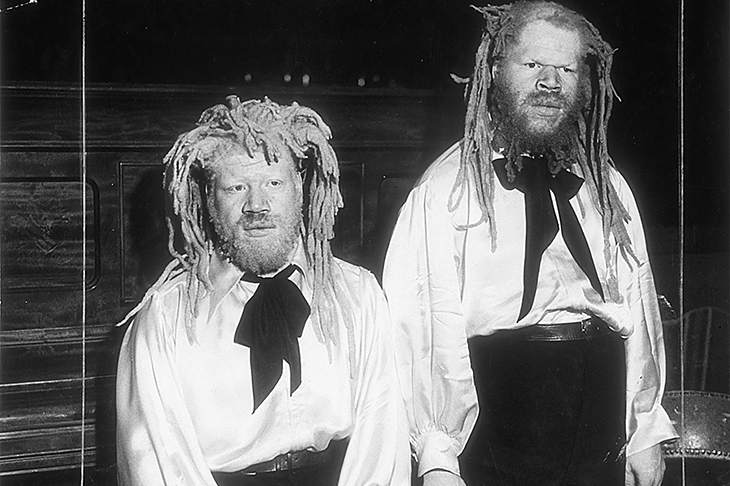It’s the early 20th century, and two strange-looking boys, purportedly twins named Iko and Eko, are playing in a circus band in one of the many stopovers on the freak-show circuit running from Ohio to Texas. The brothers are ghostly pale, with thick white dreadlocks and red eyes — natural albinos who, when they are introduced by the sideshow huckster, are described as ‘ambassadors from Mars’ — and this makes them fairly valuable.
Not as valuable as Grady the Lobster Boy, say, or Zip-the-What-Is-It?, a pinhead who had reputedly been found walking on all fours in Gambia (he was actually from New Jersey), but these ‘ambassadors from Mars’ are up there in the second tier of sideshow stars, above the giants and the dwarfs and the fat ladies. The audience does not know that they are in pain — with no protective pigmentation to defend them from the sun’s rays, their eyes water constantly and their skin peels and blisters — and the barker does not announce that these boys are neither twins nor Martians but terrified children, kidnapped from a family of poor black sharecroppers while working in the Virginia tobacco fields. Their real names are George and Willie Muse. They are casually mistreated, cheated of their earnings and, having been told the same lies over and over since their abduction, they believe their mother is dead.
On one level, Truevine is the story of the Muse brothers and their mother’s quest to win them back, a quest conducted against the highest odds, during the Jim Crow years, when the judge deciding a case might be a KKK member, and the white circus owner who believes he owns her sons could afford lawyers and detectives to back that claim. At the same time, the book chronicles Beth Macy’s own quest, as a white reporter, to get a story that the
surviving Muse family considers deeply private.
What makes her account compelling, however, is the history it offers of the lives black people had to endure in the decades following slavery, a history that seems all the more poignant in the aftermath of last year’s Black Lives Matter debates. Drawing from sources she attentively catalogues in her notes, Macy recounts the astonishing ignorance and the unspeakable violence that informed life in Virginia and elsewhere from the supposed emancipation up until the Civil Rights movement and beyond. How, for example, black sharecroppers and labourers were routinely cheated of their earnings, but
didn’t challenge the system. When Henry Kirkland questioned his landlord’s accounting, [the landlord] ‘flew into a passion — he toted a pistol all the time — over that book business and throwed that pistol on old Uncle Henry and deadened him right there.’ He shot the man’s son, too.
No wonder one government official, sent down from Washington in 1867 to ‘provide for more efficient government of the Rebel States’ remarks, in a letter to his seniors:
I find an inclination on the part of the whites, though not universal, to override and take advantage of the freedmen whether they are working for a share of the crops, or for wages.
This may well be the biggest understatement in American history.
The lengths white people would go to in order to humiliate blacks is revealing, not only in its cruelty, but also in its pettiness. One elderly white lady is remembered as keeping parrots on her screened-in front porch; they had been trained to call out, whenever black children strayed into her exclusive Salem Avenue domain, ‘See them little niggers coming.’ (The bad grammar seems revealing here.) In fact, there is a clear parallel between the ways in which black citizens were humiliated and degraded on a daily basis and the treatment of the sideshow ‘freaks’. In both cases, white men could make considerable fortunes, and enjoy surprising fame, from exploiting human beings who were all but defenceless under the law. Men like P.T. Barnum, or the Ringling Brothers, on one side, and Roanoke KKK leader Colonel R. Kent Spiller, on the other — and it is gratifying to see some of these creatures delivered some kind of comeuppance.
What runs through Truevine like a thread of bright gold, however, is the determination and, surprisingly often, the warm humour of those who, faced with an entire system rigged against them, battled on and sometimes won through. Not far into this extraordinary tale of courage and grace, Macy sets out what is, in fact, its central, indisputable idea:
As James Baldwin put it in his 1985 essay collection, ‘Freaks are called freaks and are treated as they are treated — in the main abominably — because they are human beings who cause to echo, deep within us, our most profound terrors and desires.’ The true grotesque, in Baldwin’s view, isn’t the monster or the freak but rather members of mainstream society who, clinging to safety, abhor differentness.






Comments